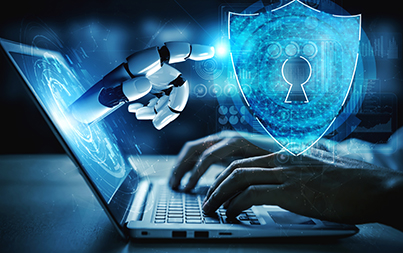
Cyber hygiene is an essential hygiene routine for your digital life. It helps you stay safe from cyber threats
 Cyber hygiene is an essential hygiene routine for your digital life. It helps you stay safe from cyber threats like malware, data breaches, phishing attacks, etc., and keeps your digital data secured.1
Cyber hygiene is an essential hygiene routine for your digital life. It helps you stay safe from cyber threats like malware, data breaches, phishing attacks, etc., and keeps your digital data secured.1
Key steps for good cyber hygiene
Good cyber hygiene is the practice of keeping your online data safe and risk-free. There are several practices to ensure that your cyber hygiene is followed in the best way. Here are the essential steps:
- Install any reputable antivirus and malware software.
- Use network firewalls.
- Update software regularly.
- Set strong passwords.
- Use multi-factor authentication.
- Employ device encryption.
- Back up regularly.
- Keep your hard drive clean.
- Secure your router.2
- Do not open suspicious emails, as criminals can gain access to personal information.
- Avoid downloading from unknown sources, as they can steal data and passwords.
- Don’t share any personal information on the internet.
- set up screen time for your child’s iPhone or iPad.
AI can be both positive and negative role player, especially when it comes to kids. According to a report by UNICEF and the World Economic Forum, risks range from privacy and safety issues to psychological and behavioral effects.
Those can come from social media, for example. AI-based algorithms use and present the data that kids (or anyone, for that matter) search for and engage with, irrespective of identifying whether the data is harmful to them or the people around them. Though social media platforms have taken steps to mitigate the problem, they haven’t been able to eradicate it.3
Everyone uploads their and their family’s pictures on social media, inspite of knowing the perils of posting them. Tech-savvy predators use Diffusion Models, a new AI tool, to pick real-life pictures from the Internet, including shots featured on social media sites and personal
blogs, and generate pictures of children engaged in sexual acts. It is difficult to differentiate whether an image is AI-generated or real. What is most worrying is that these images have the potential to disrupt tracking systems that Block child sexual abuse materials from the web.
Alarm bells in the USA
Dark web, a layer of the Internet visible only with special browsers, is being commonly used in the United States for creating AI-generated child-sex images. Shockingly, some participants even shared detailed guides for other pedophiles to make their own creations using the technology.
‘Floodgates have opened’
The floodgates have already opened, says Srijan Kumar, a computer scientist and an assistant
professor at the Georgia Institute of Technology. “AI digital tools allow manipulation at a scale that was not possible before. Fake images have been around for a while, but now they can directly target an incredibly high number of potential victims. It hardly takes any time,” says Srijan, who was honored with the ‘Forbes 30 under 30’ award for his work on social media safety and integrity.4
So do we have detection and mitigation solutions? “There are some, but they are preliminary and do not capture the different varieties of generated content. One main challenge is that as soon as new detectors are created, the generative technology evolves to incorporate ways to avoid detection from those detectors,” explains the computer scientist, who describes it as an ever-evolving arms race of sorts.
Srijan says generative AI models have reduced the cost of creating not only high-quality goods content but also bad content.
A significant dilemma still prevailing today is sharing and deciding how much to share online about your children and their lives. Knowing the increase in threats from online predators and cyberbullies, extensive inappropriate content, and online scams. Every parent should be mindful of the information they are sharing, and its context to ensure it doesn’t violate the child’s privacy or dent them emotionally when they grow up and see what has been shared.
Why is cyber hygiene necessary for parents?
Kids can get in contact with undesirable people like predators on social media, cyberbullies,
phishing scammers, etc., who could trick kids into availing of sensitive information about themselves or their parents.
Kids can also encounter inappropriate content. So, it is essential for parents to regularly check on their kids’ activities and take preventive measures to safeguard their kids and themselves from such encounters.
Cyber hygiene has various advantages, such as:
- Lowering the risks and repercussions of cyber attacks.
- Preventing unauthorized system access.
- Enhancing the state of overall security.
- Lessening the possibility of data breaches.
Although the idea of cybersecurity and cyber hygiene are related, they are not the same. Cybersecurity includes a comprehensive approach to avoiding, detecting, and recovering from threats, cyber hygiene concentrates on preventative measures for system health and security.
- https://www.digitalguardian.com/blog/what-cyber-hygiene-definition-cyber-hygiene-benefits-best-practices-and-more
- https://us.norton.com/blog/how-to/good-cyber-hygiene
- https://www.cnbc.com/2023/03/27/worried-about-your-kids-and-ai-experts-discuss-risks-and-share-tips.html
- Artificial Intelligence: Double Trouble (deccanchronicle.com)










